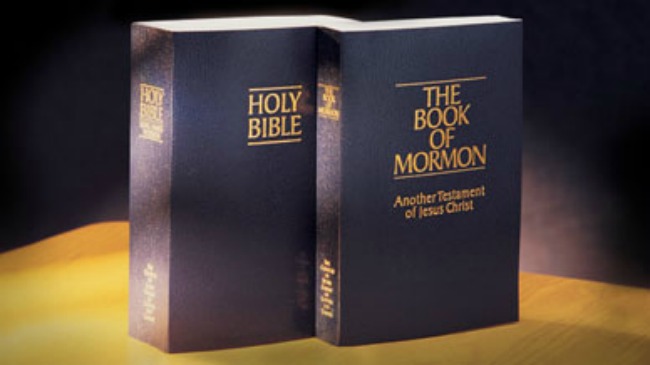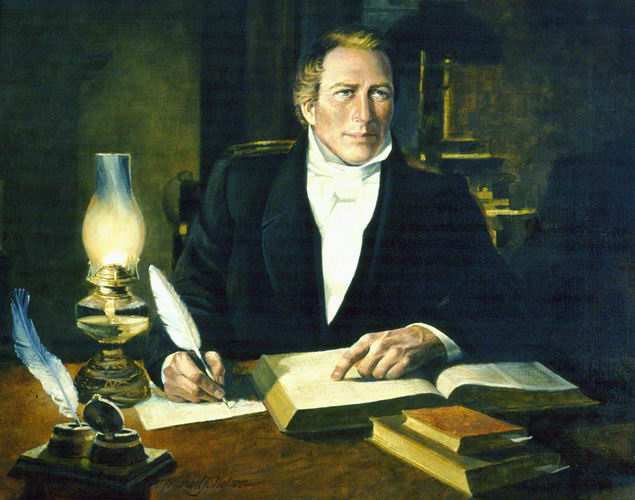Question
Dear Gramps,
I am curious to know why so many passages in the Book of Mormon are the same as those in the New Testament, particularly the beatitudes. If the bible is true insofar as it is translated correctly, then why are the passages so nearly the same, in many cases, verbatim?
Arlene
Answer
Dear Arlene,
That’s a rather profound question. Let’s take a look at it. The Book of Mormon people spoke Hebrew, but they wrote their sacred records in the Egyptian language. Then the Egyptian hieroglyphs were translated into English by the prophet Joseph Smith “by the gift and power of God.” (Book of Mormon, Testimony of the Three Witnesses)
So how did Joseph Smith do the translating? David Whitmer, who was one of the Three Witnesses to the Book of Mormon, described the translation process as follows:
“In the darkness the Spiritual light would shine. A piece of something resembling parchment would appear, and on that appeared the writing. One character at a time would appear, and under it was the interpretation in English. Brother Joseph would read off the English to Oliver Cowdery, who was his principal scribe, and when it was written down and repeated to Brother Joseph to see if it was correct, then it would disappear, and another character with the interpretation would appear. Thus the Book of Mormon was translated by the gift and power of God and not by any power of man.” (B. H. Roberts, Defense of the Faith and the Saints, Vol.1, p.256)
So the terminology in the Book of Mormon was not the terminology of Joseph Smith, but the words were dictated to him by the Lord. So now we might ask why the Lord would use the same wording that existed in the King James Version of the Bible, when it is the result of about thirteen different translations and versions from the original Greek in the New Testament and the comparatively ancient Hebrew of the Old Testament. There is no doubt that the same thought can be expressed in many different ways, but the King James Version at the time of Joseph Smith, as well as in today’s world, was and is the most widely accepted version of the Holy Scriptures. One could imagine that the Lord would have had the wording correspond with that version simply because it was the generally accepted scripture in the Christian world.
However, there is the concept, as you mention, of correct translation. So one should look at the differences between the Bible and Book of Mormon versions of the same scripture to ask what the differences are, and why they are different. Let’s look first at your concerns about the Beatitudes. There are only three verses that are different, as follows:
Blessed are the poor in spirit: for theirs is the kingdom of heaven. (Matthew 5:3)
Yea, blessed are the poor in spirit who come unto me, for theirs is the kingdom of heaven. (3 Nephi 12:3)
Looking at the Bible version, one might ask, why would the poor in spirit, rather than those that are endowed with the spirit, inherit the kingdom of heaven. This problem is instantly clarified in the Book of Mormon version. Those who repent and come to the Lord are they who come into His kingdom.
Blessed are they which do hunger and thirst after righteousness: for they shall be filled. (Matthew 5:6)
And blessed are all they who do hunger and thirst after righteousness, for they shall be filled with the Holy Ghost. (3 Nephi 12:6)
The question here from the bible verse is, filled with what? One would assume from the first part of the sentence that one would be filled with righteousness. However, the Book of Mormon version clarifies that it is not righteousness, but the Holy Ghost.
Be ye therefore perfect, even as your Father which is in heaven is perfect. (Matthew 5:48)
Therefore I would that ye should be perfect even as I, or your Father who is in heaven is perfect. (3 Nephi 12:48)
In the Book of Mormon version of this scripture the Savior includes himself as being perfect, but not in the bible version.
It is interesting that in the Joseph Smith Translation of the Bible the prophet corrected the first two quotations to match those in the Book of Mormon, but not in the third quotation. We could surmise, therefore, that both versions of the third quotation are accurate. The statement in the Bible was made by the Savior while he was yet in mortality, and in the Book of Mormon it was made by the Savior as the resurrected Lord.
Looking at the twenty chapters of Isaiah that are included in the Book of Mormon, one finds that there are a total of 348 differences between the two versions. Of these, 233 are stylistic differences where the meaning of the passage is not altered; but 115 differences actually change the meaning of the verse. These 115 substantive changes are not merely scribal errors; they represent the interpretation of the passages by the apostate scribes that copied the scriptures. To give just one example, let’s compare Isaiah 49:1 with 1 Nephi 21:1.
Listen, O isles, unto me; and hearken, ye people, from far; The LORD hath called me from the womb; from the bowels of my mother hath he made mention of my name. (Isaiah 49:1)
And again: Hearken, O ye house of Israel, all ye that are broken off and are driven out because of the wickedness of the pastors of my people; yea, all ye that are broken off, that are scattered abroad, who are of my people, O house of Israel. Listen, O isles, unto me, and hearken ye people from far; the Lord hath called me from the womb; from the bowels of my mother hath he made mention of my name. (1 Nephi 21:1)
Notice in the part in bold of the Book of Mormon version that the Lord is severely castigating the pastors of Israel because of their wickedness. Is it surprising that those pastoral scribes who were the guardians of the scriptures would leave out such a self-condemning passage in the bible vesion?
Gramps







